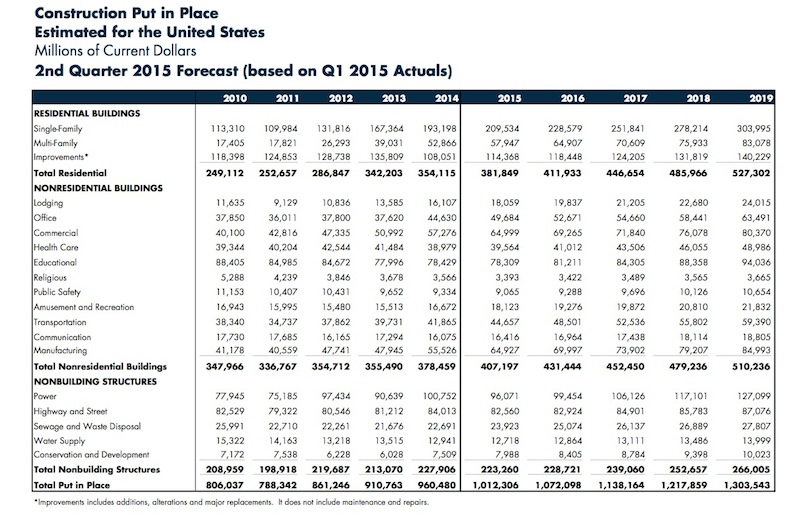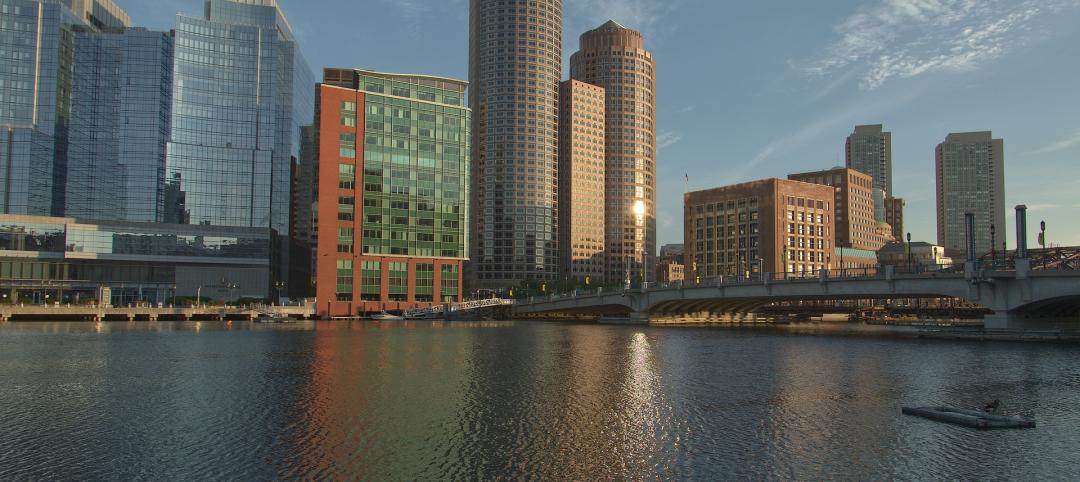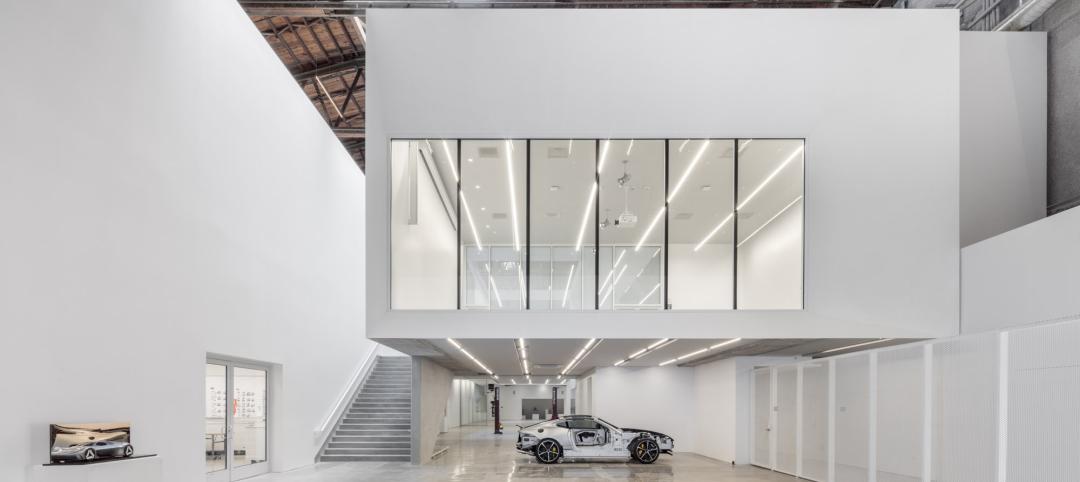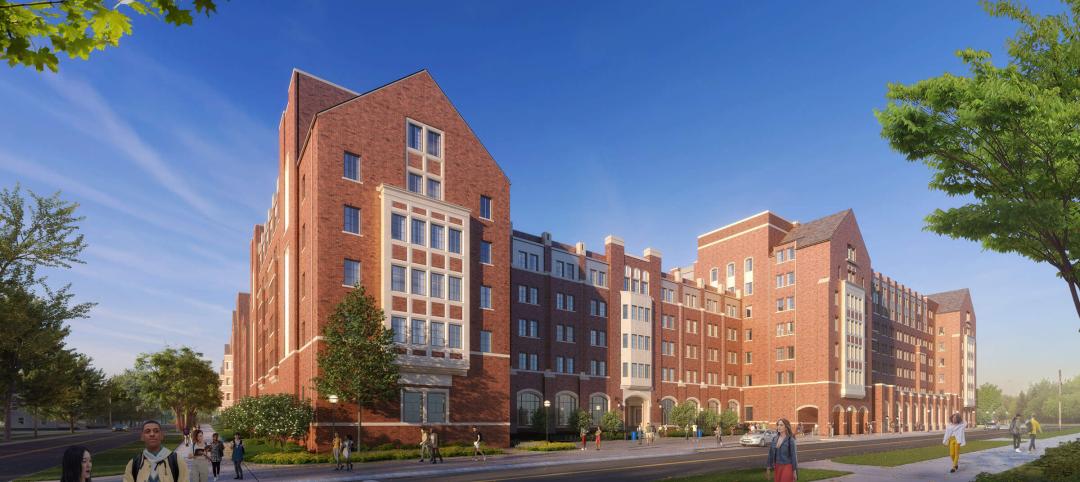The United States is on track to end this year with its highest level of construction put in place since 2008, a total that, if achieved, would represent nearly 7% of the country’s GDP.
However, construction has slowed of late, according to FMI Corporation, the management and investment consultant. In its Q2 Construction Outlook, FMI estimates construction in place this year would rise 5% to $1.012 trillion. In the first quarter, FMI had projected an 8% annualized gain.
FMI estimates the nonresidential building portion of total construction to expand by 7.6% to $407.2 billion in 2015, and to keep growing through 2019, when it should reach $510.2 billion. However, with housing also expected to recover strongly during this period, nonresidential building’s share of total construction put in place would fall in 2019 to 39.1%, from 40.2% in 2015.

Construction spending in general “continues to build on the rapid growth experienced in the industry last year,” observes Chris Daum, FMI’s senior managing director and president of Investment Banking. FMI’s latest report looks at 17 sectors. Here are some highlights:
• Don’t anticipate much from the two big-ticket sectors, Healthcare and Education, says FMI.
Even with 2.5 million students expected to enroll over the next four year, FMI doesn’t see Education growing in 2015. “One of the biggest hurdles to new construction continues to be state and local budgets,” it writes, adding that there is likely to be “significantly less” state funding for K-12 schools.”
Healthcare should fare a little better, growing by 2% in 2015, and 4% in 2016 to $41 billion. But a “difficult funding environment,” along with changes to construction delivery methods, poses challenges. One trend FMI identifies is toward rebuilding existing facilities using modern hospital design and allow for greater use of technology.
• Manufacturing: After a double-digit gain in 2014, FMI expects manufacturing construction to increase by 17% this year, and then slow to an 8% increase in 2016. It cautions that manufacturing capital construction is highly cyclical when markets reach a state of overcapacity, as some petrochemical products are expected to do in the next few years after a spate of building.
• Amusement/recreation: This section grew by 7% in 2014, and should top that at 9% in 2015. Several major sports stadiums are under construction, and a number of smaller towns and colleges are improving their sports facilities. States also continue to welcome gaming in hopes of increasing their tax bases. A new mixed-use development model combines multiple entertainment venues and shopping into an overall plan.
• Lodging: This sector will be a bright spot, growing by 19% in 2015, and by 12% in 2016, before slowing to 7% in 2019. To buttress its projections, FMI quotes from Lodging Econometrics’ May 2015 reports, which notes that there are 3,885 projects with 488,230 rooms in the construction pipeline, “with the last three quarters posting Year-Over-Year gains of 20% or greater.”
• Office: This sector is benefiting from improving employment levels, and should see 11% growth in 2015, albeit a bit slower than the 19% it hit in 2014.
• Commercial: Capturing what’s going on in retail construction, this sector is expected to grow by 13% to $69 billion this year, but be flat in 2016. “Consumers remain relatively confident about the economy, but they are also remaining conservative in their discretionary spending, at least until wage recovery improves,” FMI writes.
• Religious: What growth there is will likely be in renovation, as new congregations move into vacated retail space or reoccupy church buildings abandoned by other faiths. FMI thinks this sector could be flatlining, and quotes statistics from Pew Research Center that show the percentage of adults (ages 18 and older) who describe themselves as Christians dropping by nearly eight percentage points in just seven years through 2014. Over that same period, the percentage of Americans who are religiously unaffiliated jumped by more than six points, to 22.8%
• Transportation: After registering 5% growth in 2014, transportation is expected to add 7% for 2015 to $44.7 billion. But this sector remains heavily dependent on government support that is never a certainty.
Related Stories
Regulations | Aug 4, 2024
Diversity rules largely ignored on Boston construction projects
Not a single construction project in Boston over the past four years has met all the rules intended to diversify the construction industry and increase the number of city residents working on construction sites, according to a report in the Boston Globe.
Education Facilities | Aug 4, 2024
A former supersonic wind tunnel becomes a new educational facility for transportation design
The Mullin Transportation Design Center at ArtCenter College of Design in Pasadena, Calif., provides access for full-scale vehicular models, replicating a professional design studio.
University Buildings | Aug 1, 2024
UC Riverside’s student health center provides an environment on par with major medical centers
The University of California, Riverside's new Student Health and Counseling Center (SHCC) provides a holistic approach to wellness for students throughout the UC Riverside campus. Designed by HGA and delivered through a design-build partnership with Turner Construction Company, SHCC provides healthcare offerings in an environment on par with major medical centers.
MFPRO+ News | Aug 1, 2024
Canada tries massive incentive program to spur new multifamily housing construction
Canada has taken the unprecedented step of offering billions in infrastructure funds to communities in return for eliminating single-family housing zoning.
Government Buildings | Aug 1, 2024
One of the country’s first all-electric fire stations will use no outside energy sources
Charlotte, N.C.’s new Fire Station #30 will be one of the country’s first all-electric fire stations, using no outside energy sources other than diesel fuel for one or two of the fire trucks. Multiple energy sources will power the station, including solar roof panels and geothermal wells. The two-story building features three truck bays, two fire poles, dispatch area, contamination room, and gear storage.
Contractors | Aug 1, 2024
Nonresidential construction spending decreased 0.2% in June
National nonresidential construction spending declined 0.2% in June, according to an Associated Builders and Contractors analysis of data published today by the U.S. Census Bureau. On a seasonally adjusted annualized basis, nonresidential spending totaled $1.21 trillion. Nonresidential construction has expanded 5.3% from a year ago.
Student Housing | Jul 31, 2024
The University of Michigan addresses a decades-long student housing shortage with a new housing-dining facility
The University of Michigan has faced a decades-long shortage of on-campus student housing. In a couple of years, the situation should significantly improve with the addition of a new residential community on Central Campus in Ann Arbor, Mich. The University of Michigan has engaged American Campus Communities in a public-private partnership to lead the development of the environmentally sustainable living-learning student community.
MFPRO+ New Projects | Jul 31, 2024
Shipping containers converted into attractive, affordable multifamily housing in L.A.
In the Watts neighborhood in Los Angeles, a new affordable multifamily housing project using shipping containers resulted in 24 micro-units for formerly unhoused residents. The containers were acquired from a nearby port and converted into housing units at a factory.
Adaptive Reuse | Jul 30, 2024
Empty mall to be converted to UCLA Research Park
UCLA recently acquired a former mall that it will convert into the UCLA Research Park that will house the California Institute for Immunology and Immunotherapy at UCLA and the UCLA Center for Quantum Science and Engineering, as well as programs across other disciplines. The 700,000-sf property, formerly the Westside Pavilion shopping mall, is two miles from the university’s main Westwood campus. Google, which previously leased part of the property, helped enable and support UCLA’s acquisition.
Contractors | Jul 30, 2024
Barton Malow is celebrating its 100th anniversary with a road show
A traveling exhibit will make 30 stops this summer and fall, many at project sites.

















